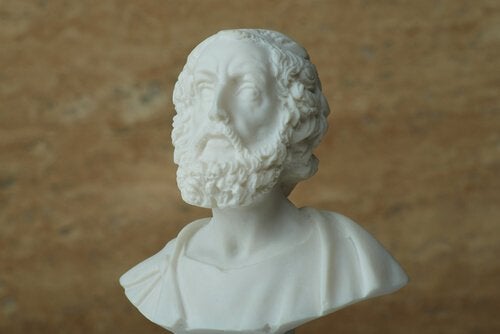Homer is known for being one of the first poets of ancient Greece. Or at least one of the first we know. We must keep in mind that when we talk about works of classical antiquity, most of them have been lost or have only come to us fragmented.
In ancient times, there was no impression and the way written texts were transmitted and preserved was difficult. After the fall of the Roman Empire, most of the written texts were lost, although in medieval times monasteries were responsible for translating and copying Greek texts.
- It is believed that in Rome there were about 800 authors.
- Of which we know only 140.
- So the task of tracking and demarcating the works and authors of antiquity is really difficult.
It is therefore difficult to know with certainty the authorship of many of the best-known works; in Homer’s case, he is credited with the two main Greek epic poems: Lyaada and Odyssey, from the 8th century BC.
For many historians and scholars, Homer opened the doors of the West to literary creation; Furthermore, he introduced Greek mythology and, thanks to him, we can get an idea of what Greek society was like in his time.
Therefore, when we talk about Homer, we mean the birth of Western literature, a historical and ethnographic source, an example to follow as the great sage of his time.
Although his two great works have been carefully studied, little is known about Homer’s biography, like many authors of his time, we have clues and hypotheses, but we cannot say anything with certainty.
There are indications of their origin in historical texts after their time, but in some cases these texts contradict each other.
Therefore, it is considered that most of Homer’s biographies that circulated in ancient times do not contain reliable data on the poet; however, current historians admit that Homer originated in the Ionian colonial region of Asia Minor, due to the linguistic features of his works.
Reality and fiction are very close in their figure and also in their work. In ancient times, the Lyaade and the Odyssey were considered historical texts, which narrated real facts, so it is not surprising that there are contradictions in his biography.
Thus, the figure of Homer is confused between reality and history, so he is usually characterized as a blind poet who traveled the Greek world in the 8th century BC.
During his travels, he worked to recite his epic poems to those who listened to him, his spectators ranging from the inhabitants of a simple city crowded in a square to the nobility gathered in large theaters within a palace.
It should be noted that literary transmission was, for the most part, oral, which prevented the preservation of many texts, not only of the classical era, but also of medieval.
Epic is a literary genre in which the hero’s exploits are narrated. The purpose of this genus is to value the values of a people, so it had its boom in antiquity and remained (despite some changes) in medieval times.
Some of these poems never reached the half-written or were lost in time. The Lyaade and the Odyssey, in addition to having survived, have been imitated and considered great models of antiquity for centuries. That’s where Homer’s importance lies.
Through detailed analysis of the Odyssey and the Lyaade, there was a doubt that Homer might not exist as a single individual, some say homer would be a kind of pseudonym under which several unknown authors would be grouped, these doubts about his existence were called homoric questions.
Two important issues arise in the debate between researchers in the homic literature:
Despite these debates, it is undeniable that Homer and his works are the pillars of Western literature. Anyone studying literature or art history knows that Homer is the first name to appear in the literary scene.
Homer was also imitated in ancient times: Eneida, the great epic of the Roman Empire, is a kind of reinterpretation of Homer’s works.
Few human disciplines can escape Homer’s work: from literature to philosophy, archaeology and history, they all constantly cite Homer, either as a source of inspiration or as a historical source for the study of ancient Greece.
Reducing Homer’s work to Lyaade and Odyssey would be too easy to simplify production. Currently, he is credited with other works. For example, the comic parody that bears the name Batracomyomaquia?The battle of frogs and rats. He is also considered to have written manic hymns and other fragmented works, such as Margites.
It can be said that, throughout his work, Homer shaped Greek society at the end of the archaic period (eighth century BC), a society based on caudillism, in which slavery and sacrifices existed to the gods, also describes the courts and a society with ethical values based on respect for women, the elderly , beggars and the corpses of enemies.
We are definitely faced with an author who has been able to survive in time, an author whose reading remains fundamental today, whether in class or outside it. Homer, whatever his identity, will remain the great epic poet of antiquity.

